Unit 13 We're trying to save the earth! Section A (1a~2d) 课件(共24张PPT)
文档属性
| 名称 | Unit 13 We're trying to save the earth! Section A (1a~2d) 课件(共24张PPT) | 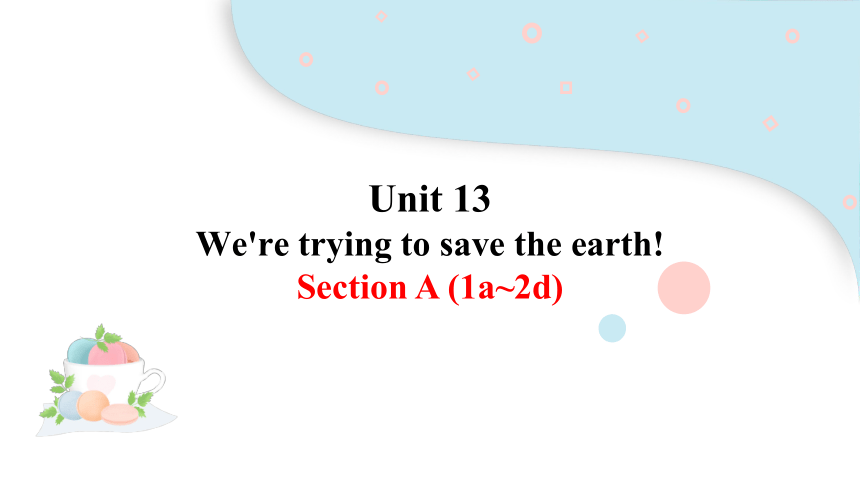 | |
| 格式 | pptx | ||
| 文件大小 | 41.6MB | ||
| 资源类型 | 教案 | ||
| 版本资源 | 人教新目标(Go for it)版 | ||
| 科目 | 英语 | ||
| 更新时间 | 2024-07-21 23:01:36 | ||
图片预览

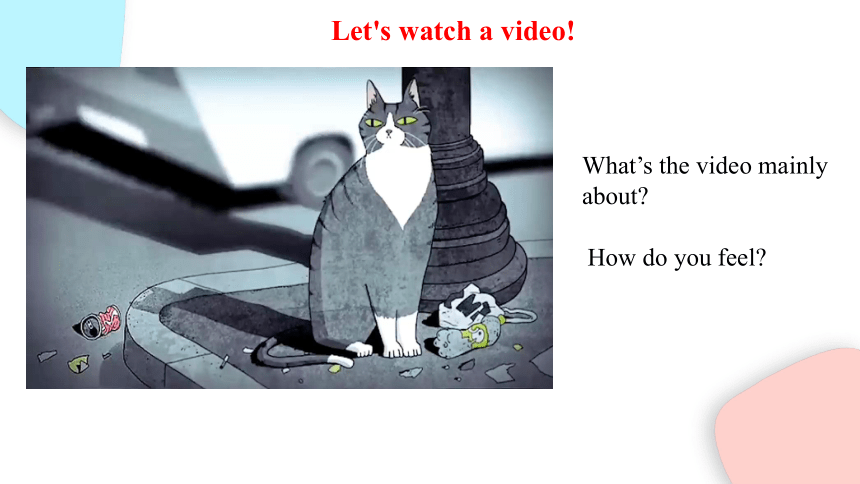
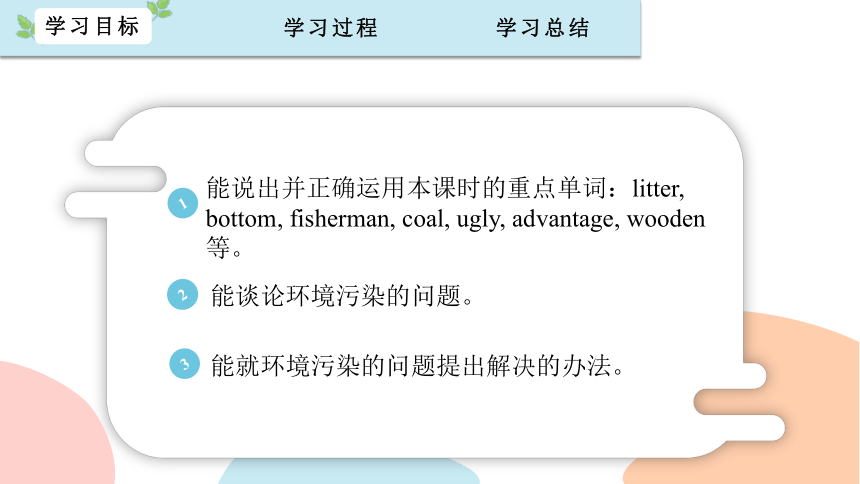
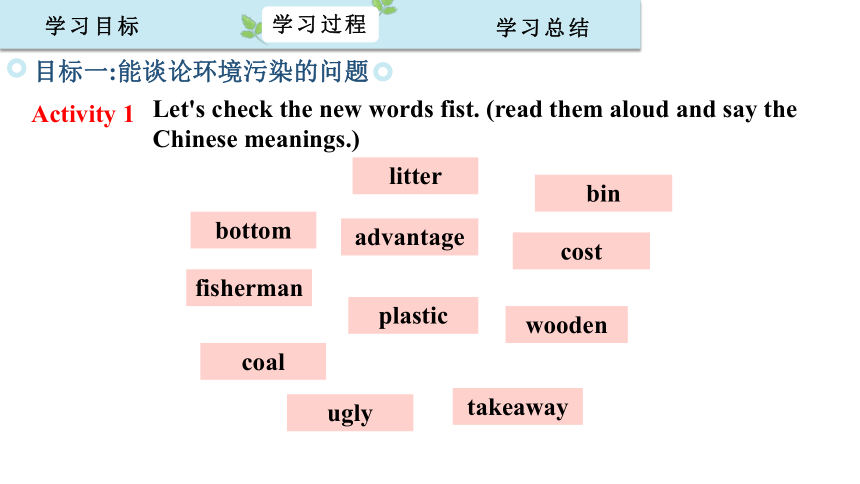
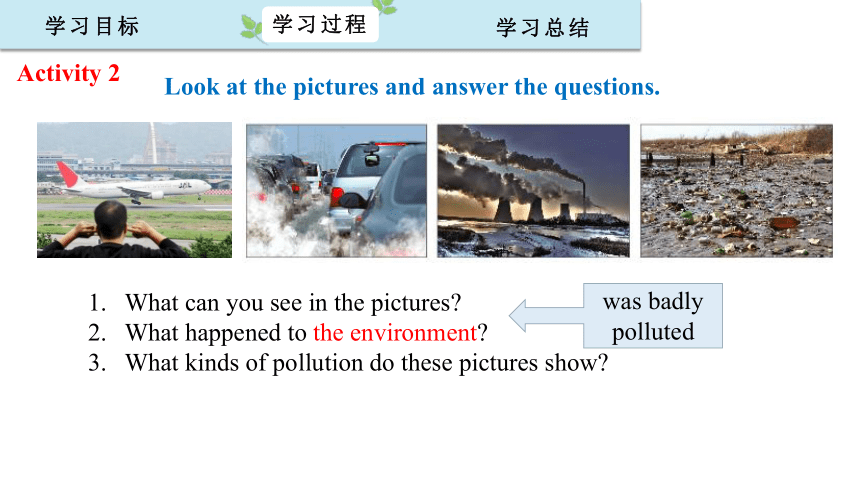
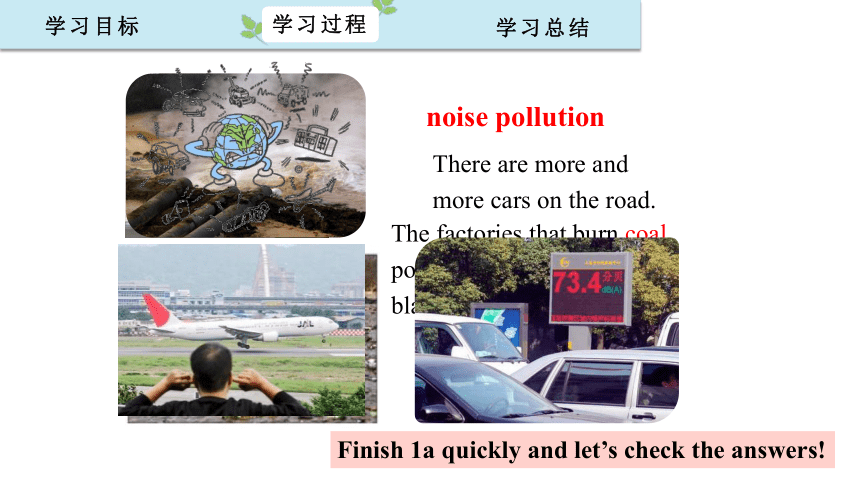
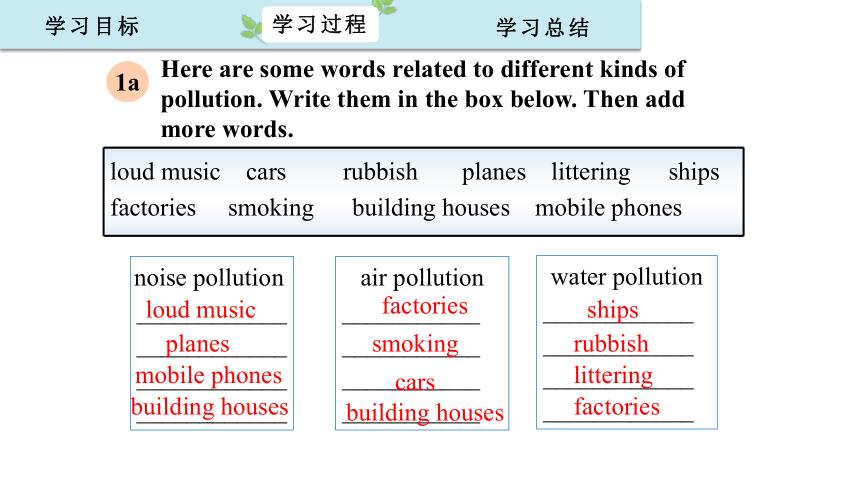
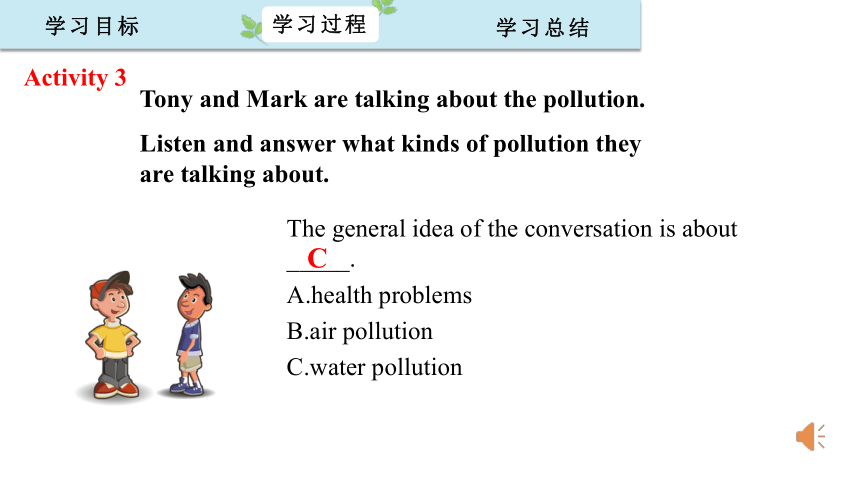
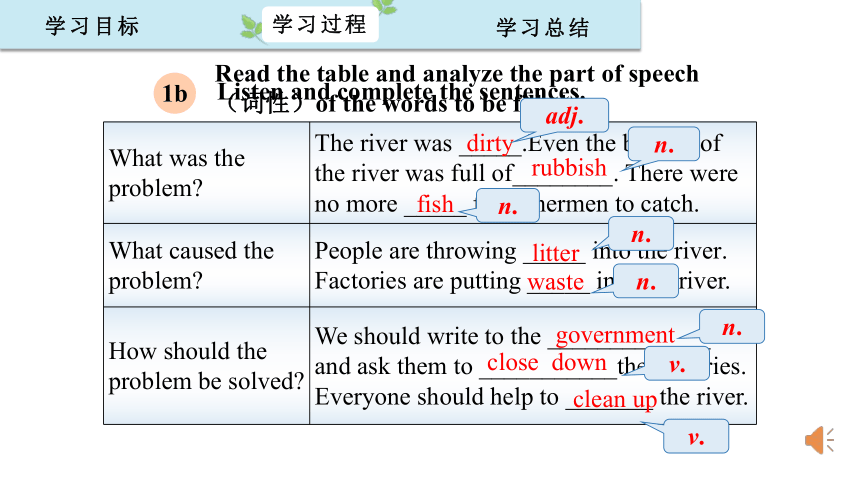
文档简介
(共24张PPT)
Unit 13
We're trying to save the earth!
Section A (1a~2d)
Let's watch a video!
What’s the video mainly about
How do you feel
能说出并正确运用本课时的重点单词:litter, bottom, fisherman, coal, ugly, advantage, wooden
等。
1
2
3
能谈论环境污染的问题。
能就环境污染的问题提出解决的办法。
目标一:能谈论环境污染的问题
litter
plastic
takeaway
bin
cost
advantage
bottom
coal
fisherman
ugly
Let's check the new words fist. (read them aloud and say the Chinese meanings.)
wooden
Activity 1
Activity 2
Look at the pictures and answer the questions.
What can you see in the pictures
What happened to the environment
What kinds of pollution do these pictures show
was badly polluted
air pollution
The factories that burn coal pollute the air with a lot of
black smoke.
Factories put waste into the river.
water pollution
noise pollution
There are more and more cars on the road.
Finish 1a quickly and let’s check the answers!
Here are some words related to different kinds of pollution. Write them in the box below. Then add more words.
1a
noise pollution
____________
____________
____________
____________
air pollution
___________
___________
___________
___________
water pollution
____________
____________
____________
____________
loud music
planes
mobile phones
factories
cars
smoking
ships
factories
littering
rubbish
building houses
building houses
loud music cars rubbish planes littering ships factories smoking building houses mobile phones
Tony and Mark are talking about the pollution.
Activity 3
Listen and answer what kinds of pollution they are talking about.
The general idea of the conversation is about _____.
A.health problems
B.air pollution
C.water pollution
C
Listen and complete the sentences.
1b
What was the problem The river was _____.Even the bottom of the river was full of________. There were no more _____ for fishermen to catch.
What caused the problem People are throwing _____ into the river. Factories are putting _____ into the river.
How should the problem be solved We should write to the _____________
and ask them to ___________the factories. Everyone should help to _______ the river.
dirty
rubbish
fish
litter
waste
government
close down
clean up
Read the table and analyze the part of speech (词性)of the words to be filled in.
adj.
n.
n.
n.
n.
n.
v.
v.
Listen again and answer the questions.
What does Tony want to do later this afternoon
Why doesn’t Mark want to go with Tony
How was the river in the past
He wants to go swimming with Mark in the river later this afternoon.
Because the river was really dirty. Even the bottom of the river was full of rubbish, and there were no more fish for fishermen to catch.
It used to be so clean. It has been the nicest river in this town.
Check your answers.Then imitate.
Tony: Hey, Mark, maybe we could go swimming in the river later this afternoon.
Mark: I don’t think I want to go, Tony.
Tony: Why not
Mark: I was there last weekend and the river was really dirty. Even the bottom of the river was full of rubbish, and there were no more fish for fishermen to catch.
Tony: No way! It used to be so clean. In fact, it has always been the nicest river in this town.
Mark: Not anymore. I think people are throwing litter into the river. Factories are also putting waste into the river.
Tony: That’s terrible! We should write to the government. They should close down the factories.
Mark: Good idea! But I think everyone in this town should help to clean up the river, too. Everyone should play a part, not just the government.
the bottom of 在...底部
from top to bottom 从上到下
used to do sth. “过去常常… …”表示过去习惯性的动作已不存在
play a part in doing sth.“参与做某事,在做某事上起作用”
litter和rubbish都可指“垃圾”,用作不可数名词。
rubbish指“没用的东西(被扔或将要丢弃的无用的东西)”不可回收。
litter指“(室内或公共场所)乱扔的废物(纸屑、不要的包装纸、废瓶等)”还可回收。
Role-play the conversation. Then make your own conversations about the kinds of pollution in 1a.
1c
Pair work
Activity 4
Mark:The river was dirty. Even the bottom
of the river was full of rubbish.
Tony: But it used to be so clean!
Mark:Yes, but people are throwing litter
into the river.
Tony:Everyone in this town should play a
part in cleaning it up!
目标二:能就环境污染的问题提出解决的办法
Activity 1
Listen to the interview. Circle the kinds of pollution that Jason and Susan talk about.
2a
A. land pollution
B. air pollution
C. noise pollution
D. water pollution
Listen again and complete the sentences.
2b
1.The air is badly polluted because there are __________on the
road these days.
2.Factories that burn coal also ________ the air with a lot of
black smoke.
3.There is also too much rubbish and waste. People _________
________things every day.
4.People are also littering in _____________ like parks. This
is turning beautiful places into ugly ones.
more cars
are throwing
away
pollute
public places
Use the information in 2a and 2b to role-play
conversations between Jason and Susan.
2c
Activity 2
The air has become really polluted around here. I’m getting very worried.
Yes, I used to be able to see stars in the sky.
The problem is that…
Discussion
What should we do to save the earth
1. Turn off the lights when you leave a room.
关掉
2. stop riding in cars
3. stop using paper towels or napkins(餐巾,餐巾纸)
4. recycle books and paper
回收利用
5. ...
Activity 3
Activity 4
“火眼金睛”
请快速找出2d中含有保护环境的方法的句子。
I think simple things like bringing a bag to go shopping can help.
Well, to cut down air pollution, we should take the
bus or subway instead of driving.Yeah, or ride a bike.
Also, I never take wooden chopsticks or plastic forks when I buy takeaway food.
And remember to throw rubbish in the bins and keep
public places clean and beautiful for everyone.
Read 2d and complete the chart.
Problems Solving problems
air pollution
waste pollution
rubbish
take the bus, subway or ride a bike instead of driving
bring a bag to go shopping, never
take wooden chopsticks or plastic forks but use the ones at home while buying takeway food
throw rubbish in the bins
Interviewer: Jason and Susan, what are your ideas for solving these problems
Jason: Well, to cut down air pollution, we should take the bus or subway instead of driving.
Susan: Yeah, or ride a bike. There are other advantages of bike riding. It’s good for health and it doesn’t cost anything!
Interviewer: Great ideas! What about waste pollution
Susan: Mmm, I think simple things like bringing a bag to go shopping can help. I started doing that a year ago.
Let's check the answers.
Jason: Me, too. Also, I never take wooden chopsticks or plastic forks when I buy takeaway food. I use the ones at home.
Susan: And remember to throw rubbish in the bins and keep public places clean and beautiful for everyone.
Interviewer: So together, our actions can make a difference and lead to better future!
起作用,有影响
减少
the advantage of …“…的优点”
cost v. 花费;使付出指花费金钱,主语通常是物。
cost的过去式和过去分词均为cost。
(2) spend多表示花费时间和金钱,主语通常是人,常用于sb. spend(s) some time / money on sth.和sb. spend(s) some time / money (in) doing sth.两种句型。
e.g. David spent 2,000 yuan on the new machine.
My father spends an hour (in) watching the news on TV every day.
辨析:take, spend, pay & cost
take,spend,pay和cost都可以表示“花费”,但它们的用法各有不同。
(1) take多表示花费时间,常用于It takes sb. some time to do sth.这一句型中,其中it作形式主语。
e.g. It usually takes me 40 minutes to cook the dinner.
辨析:take, spend, pay & cost
(4) cost多表示花费金钱,主语通常是物,
常用于sth. cost(s) (sb.) some money.句型。
e.g. The new dress cost Linda 88 yuan.
(3) pay多表示花费金钱,主语通常是人,
常用于sb. pay(s) some money for sth.句型。
e.g. Tommy paid 20 yuan for his breakfast yesterday.
role-play the conversation.
2d
Read the dialogue aloud for a few minutes by yourself;
Role play in groups;
Role play in front of the class.
We’ll see which group does the best.
Role play
Interviewer: Jason and Susan, what are your ideas for solving these problems
Jason: Well, to cut down air pollution, we should take the bus or subway instead of driving.
Susan: Yeah, or ride a bike. There are other advantages of bike riding. It’s good for health and it doesn’t cost anything!
Interviewer: Great ideas! What about waste pollution
Susan: Mmm, I think simple things like bringing a bag to go shopping can help. I started doing that a year ago.
Jason: Me, too. Also, I never take wooden chopsticks or plastic forks when I buy takeaway food. I use the ones at home.
Susan: And remember to throw rubbish in the bins and keep public places clean and beautiful for everyone.
Interviewer: So together, our actions can make a difference and lead to better future!
Four students in a group, talk about the environmental pollution around you, and how to solve this problem then draw it into a cartoon. A representative introduce the cartoon to the whole class and say the solutions.
Unit 13
We're trying to save the earth!
Section A (1a~2d)
Let's watch a video!
What’s the video mainly about
How do you feel
能说出并正确运用本课时的重点单词:litter, bottom, fisherman, coal, ugly, advantage, wooden
等。
1
2
3
能谈论环境污染的问题。
能就环境污染的问题提出解决的办法。
目标一:能谈论环境污染的问题
litter
plastic
takeaway
bin
cost
advantage
bottom
coal
fisherman
ugly
Let's check the new words fist. (read them aloud and say the Chinese meanings.)
wooden
Activity 1
Activity 2
Look at the pictures and answer the questions.
What can you see in the pictures
What happened to the environment
What kinds of pollution do these pictures show
was badly polluted
air pollution
The factories that burn coal pollute the air with a lot of
black smoke.
Factories put waste into the river.
water pollution
noise pollution
There are more and more cars on the road.
Finish 1a quickly and let’s check the answers!
Here are some words related to different kinds of pollution. Write them in the box below. Then add more words.
1a
noise pollution
____________
____________
____________
____________
air pollution
___________
___________
___________
___________
water pollution
____________
____________
____________
____________
loud music
planes
mobile phones
factories
cars
smoking
ships
factories
littering
rubbish
building houses
building houses
loud music cars rubbish planes littering ships factories smoking building houses mobile phones
Tony and Mark are talking about the pollution.
Activity 3
Listen and answer what kinds of pollution they are talking about.
The general idea of the conversation is about _____.
A.health problems
B.air pollution
C.water pollution
C
Listen and complete the sentences.
1b
What was the problem The river was _____.Even the bottom of the river was full of________. There were no more _____ for fishermen to catch.
What caused the problem People are throwing _____ into the river. Factories are putting _____ into the river.
How should the problem be solved We should write to the _____________
and ask them to ___________the factories. Everyone should help to _______ the river.
dirty
rubbish
fish
litter
waste
government
close down
clean up
Read the table and analyze the part of speech (词性)of the words to be filled in.
adj.
n.
n.
n.
n.
n.
v.
v.
Listen again and answer the questions.
What does Tony want to do later this afternoon
Why doesn’t Mark want to go with Tony
How was the river in the past
He wants to go swimming with Mark in the river later this afternoon.
Because the river was really dirty. Even the bottom of the river was full of rubbish, and there were no more fish for fishermen to catch.
It used to be so clean. It has been the nicest river in this town.
Check your answers.Then imitate.
Tony: Hey, Mark, maybe we could go swimming in the river later this afternoon.
Mark: I don’t think I want to go, Tony.
Tony: Why not
Mark: I was there last weekend and the river was really dirty. Even the bottom of the river was full of rubbish, and there were no more fish for fishermen to catch.
Tony: No way! It used to be so clean. In fact, it has always been the nicest river in this town.
Mark: Not anymore. I think people are throwing litter into the river. Factories are also putting waste into the river.
Tony: That’s terrible! We should write to the government. They should close down the factories.
Mark: Good idea! But I think everyone in this town should help to clean up the river, too. Everyone should play a part, not just the government.
the bottom of 在...底部
from top to bottom 从上到下
used to do sth. “过去常常… …”表示过去习惯性的动作已不存在
play a part in doing sth.“参与做某事,在做某事上起作用”
litter和rubbish都可指“垃圾”,用作不可数名词。
rubbish指“没用的东西(被扔或将要丢弃的无用的东西)”不可回收。
litter指“(室内或公共场所)乱扔的废物(纸屑、不要的包装纸、废瓶等)”还可回收。
Role-play the conversation. Then make your own conversations about the kinds of pollution in 1a.
1c
Pair work
Activity 4
Mark:The river was dirty. Even the bottom
of the river was full of rubbish.
Tony: But it used to be so clean!
Mark:Yes, but people are throwing litter
into the river.
Tony:Everyone in this town should play a
part in cleaning it up!
目标二:能就环境污染的问题提出解决的办法
Activity 1
Listen to the interview. Circle the kinds of pollution that Jason and Susan talk about.
2a
A. land pollution
B. air pollution
C. noise pollution
D. water pollution
Listen again and complete the sentences.
2b
1.The air is badly polluted because there are __________on the
road these days.
2.Factories that burn coal also ________ the air with a lot of
black smoke.
3.There is also too much rubbish and waste. People _________
________things every day.
4.People are also littering in _____________ like parks. This
is turning beautiful places into ugly ones.
more cars
are throwing
away
pollute
public places
Use the information in 2a and 2b to role-play
conversations between Jason and Susan.
2c
Activity 2
The air has become really polluted around here. I’m getting very worried.
Yes, I used to be able to see stars in the sky.
The problem is that…
Discussion
What should we do to save the earth
1. Turn off the lights when you leave a room.
关掉
2. stop riding in cars
3. stop using paper towels or napkins(餐巾,餐巾纸)
4. recycle books and paper
回收利用
5. ...
Activity 3
Activity 4
“火眼金睛”
请快速找出2d中含有保护环境的方法的句子。
I think simple things like bringing a bag to go shopping can help.
Well, to cut down air pollution, we should take the
bus or subway instead of driving.Yeah, or ride a bike.
Also, I never take wooden chopsticks or plastic forks when I buy takeaway food.
And remember to throw rubbish in the bins and keep
public places clean and beautiful for everyone.
Read 2d and complete the chart.
Problems Solving problems
air pollution
waste pollution
rubbish
take the bus, subway or ride a bike instead of driving
bring a bag to go shopping, never
take wooden chopsticks or plastic forks but use the ones at home while buying takeway food
throw rubbish in the bins
Interviewer: Jason and Susan, what are your ideas for solving these problems
Jason: Well, to cut down air pollution, we should take the bus or subway instead of driving.
Susan: Yeah, or ride a bike. There are other advantages of bike riding. It’s good for health and it doesn’t cost anything!
Interviewer: Great ideas! What about waste pollution
Susan: Mmm, I think simple things like bringing a bag to go shopping can help. I started doing that a year ago.
Let's check the answers.
Jason: Me, too. Also, I never take wooden chopsticks or plastic forks when I buy takeaway food. I use the ones at home.
Susan: And remember to throw rubbish in the bins and keep public places clean and beautiful for everyone.
Interviewer: So together, our actions can make a difference and lead to better future!
起作用,有影响
减少
the advantage of …“…的优点”
cost v. 花费;使付出指花费金钱,主语通常是物。
cost的过去式和过去分词均为cost。
(2) spend多表示花费时间和金钱,主语通常是人,常用于sb. spend(s) some time / money on sth.和sb. spend(s) some time / money (in) doing sth.两种句型。
e.g. David spent 2,000 yuan on the new machine.
My father spends an hour (in) watching the news on TV every day.
辨析:take, spend, pay & cost
take,spend,pay和cost都可以表示“花费”,但它们的用法各有不同。
(1) take多表示花费时间,常用于It takes sb. some time to do sth.这一句型中,其中it作形式主语。
e.g. It usually takes me 40 minutes to cook the dinner.
辨析:take, spend, pay & cost
(4) cost多表示花费金钱,主语通常是物,
常用于sth. cost(s) (sb.) some money.句型。
e.g. The new dress cost Linda 88 yuan.
(3) pay多表示花费金钱,主语通常是人,
常用于sb. pay(s) some money for sth.句型。
e.g. Tommy paid 20 yuan for his breakfast yesterday.
role-play the conversation.
2d
Read the dialogue aloud for a few minutes by yourself;
Role play in groups;
Role play in front of the class.
We’ll see which group does the best.
Role play
Interviewer: Jason and Susan, what are your ideas for solving these problems
Jason: Well, to cut down air pollution, we should take the bus or subway instead of driving.
Susan: Yeah, or ride a bike. There are other advantages of bike riding. It’s good for health and it doesn’t cost anything!
Interviewer: Great ideas! What about waste pollution
Susan: Mmm, I think simple things like bringing a bag to go shopping can help. I started doing that a year ago.
Jason: Me, too. Also, I never take wooden chopsticks or plastic forks when I buy takeaway food. I use the ones at home.
Susan: And remember to throw rubbish in the bins and keep public places clean and beautiful for everyone.
Interviewer: So together, our actions can make a difference and lead to better future!
Four students in a group, talk about the environmental pollution around you, and how to solve this problem then draw it into a cartoon. A representative introduce the cartoon to the whole class and say the solutions.
同课章节目录
- Unit 1 How can we become good learners.
- Section A
- Section B
- Unit 2 I think that mooncakes are delicious!
- Section A
- Section B
- Unit 3 Could you please tell me where the restroom
- Section A
- Section B
- Unit 4 I used to be afraid of the dark.
- Section A
- Section B
- Unit 5 What are the shirts made of?
- Section A
- Section B
- Review of Units 1-5
- Unit 6 When was it invented?
- Section A
- Section B
- Unit 7 Teenagers should be allowed to choose their
- Section A
- Section B
- Unit 8 It must belong to Carla.
- Section A
- Section B
- Unit 9 I like music that I can dance to.
- Section A
- Section B
- Unit 10 You're supposed to shake hands.
- Section A
- Section B
- Review of Units 6-10
- Unit 11 Sad movies make me cry.
- Section A
- Section B
- Unit 12 Life is full of the unexpected
- Section A
- Section B
- Unit 13 We're trying to save the earth!
- Section A
- Section B
- Unit 14 I remember meeting all of you in Grade 7.
- Section A
- Section B
- Review of Units 11-14
